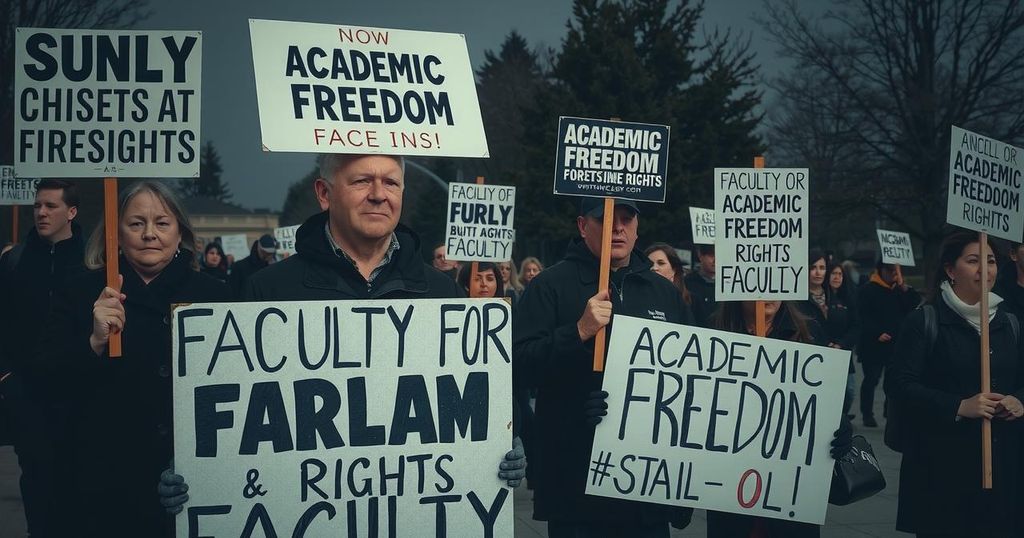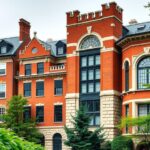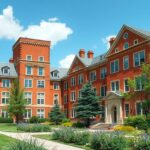Elections
Politics
AFFIRMATIVE ACTION, AMERICAN ASSOCIATION OF UNIVERSITY, AMERICAN ASSOCIATION OF UNIVERSITY PROFESSORS, BARNARD COLLEGE, CENTER FOR PALESTINE STUDIES, CIVIL RIGHTS, COLUMBIA, COLUMBIA AMERICAN ASSOCIATION OF UNIVERSITY, COLUMBIA AMERICAN ASSOCIATION OF UNIVERSITY PROFESSORS, COLUMBIA UNIVERSITY, DH, ELI, FREEDOM SOCIALIST PARTY, INSTITUTE FOR ISRAEL AND JEWISH STUDIES, IVY LEAGUE, JED HOLTZ, MICHAEL THADDEUS, POLITICS, SOCIAL JUSTICE, STUDENT PROTESTS, STUDENT WORKERS OF COLUMBIA, TRUMP, TRUMP ADMINISTRATION
Omar El-Sharif
Columbia University Professors Demand Academic Freedom Amid Policy Changes
Professors at Columbia University protested policy changes after the Trump administration’s demands, aimed at restoring $400 million in federal funding. They voiced concerns about threats to academic freedom and insufficient measures against antisemitism. The interim president introduced various changes, raising further debates regarding academic oversight and student protections. Faculty and students are actively engaged in discussions about the university’s direction in balancing compliance and core missions.
Columbia University professors have protested recent policy changes following the institution’s acquiescence to several demands by the Trump administration, aiming to secure the reinstatement of $400 million in federal funding. Professors emphasize concerns regarding academic freedom, arguing that the adjustments made do not adequately address the issues of antisemitism on campus. On the first day back from spring break, they held a vigil, donning black attire to symbolize their mourning over perceived threats to academic autonomy.
During the protest, Michael Thaddeus, a mathematics professor and vice president of the American Association of University Professors, expressed that faculty members, protected by tenure, are better insulated from political influences than university administrators. The Student Workers of Columbia union also joined the demonstration, advocating for the establishment of a sanctuary campus to protect immigrant student workers from vulnerability amidst administrative changes.
The interim president’s announcement detailed new measures, including the hiring of 36 special officers with arresting authority, alterations to the disciplinary process, and the introduction of new oversight positions, which have raised concerns among faculty members regarding greater scrutiny of specific academic programs. Dhananjay Jagannathan, an assistant philosophy professor, warned that such oversight could unfairly target scholars engaged in delicate areas of study.
Further debates emerged surrounding the definition of antisemitism that Columbia should adopt, with some advocating for alignment with the International Holocaust Remembrance Alliance’s standards. Critics argue that the university’s language in its policies is insufficient, particularly regarding the management of protests and the prohibition of masks during these events. In response, Columbia conveyed its commitment to fostering academic discourse and maintaining a focus on combating all forms of discrimination while safeguarding free expression.
U.S. Secretary of Education Linda McMahon has indicated that Columbia is making progress towards unlocking federal funding, reinforcing the federal government’s engagement in this matter. However, inquiries directed to the Trump administration about timelines have yet to yield a response.
Columbia University professors expressed deep concerns regarding recent policy modifications imposed by the Trump administration, primarily aiming to secure federal funding, which they believe jeopardizes academic freedom. The protests highlight a broader dialogue regarding the institution’s obligations to combat antisemitism while preserving rights for all students, particularly vulnerable immigrant workers. The discourse continues as the university navigates the complexities of academic governance and compliance with federal expectations.
Original Source: www.cbsnews.com








Post Comment